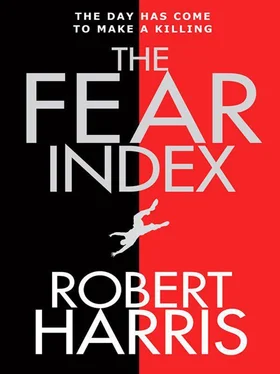Robert Harris - The Fear Index
Здесь есть возможность читать онлайн «Robert Harris - The Fear Index» весь текст электронной книги совершенно бесплатно (целиком полную версию без сокращений). В некоторых случаях можно слушать аудио, скачать через торрент в формате fb2 и присутствует краткое содержание. Жанр: Триллер, на английском языке. Описание произведения, (предисловие) а так же отзывы посетителей доступны на портале библиотеки ЛибКат.
- Название:The Fear Index
- Автор:
- Жанр:
- Год:неизвестен
- ISBN:нет данных
- Рейтинг книги:4 / 5. Голосов: 1
-
Избранное:Добавить в избранное
- Отзывы:
-
Ваша оценка:
- 80
- 1
- 2
- 3
- 4
- 5
The Fear Index: краткое содержание, описание и аннотация
Предлагаем к чтению аннотацию, описание, краткое содержание или предисловие (зависит от того, что написал сам автор книги «The Fear Index»). Если вы не нашли необходимую информацию о книге — напишите в комментариях, мы постараемся отыскать её.
The Fear Index — читать онлайн бесплатно полную книгу (весь текст) целиком
Ниже представлен текст книги, разбитый по страницам. Система сохранения места последней прочитанной страницы, позволяет с удобством читать онлайн бесплатно книгу «The Fear Index», без необходимости каждый раз заново искать на чём Вы остановились. Поставьте закладку, и сможете в любой момент перейти на страницу, на которой закончили чтение.
Интервал:
Закладка:
Professor Walton’s assistant had left her in the lobby of the Computing Centre and gone off to find him. Now she was alone, she was strongly tempted to flee. What had seemed a good idea in the bathroom in Cologny after finding his card – calling him, ignoring his surprise, asking if she could come over right away: she would tell him what it was about when she saw him – now struck her as hysterical and embarrassing. Turning round to find the way out, she noticed an old computer in a glass case. When she went closer, she read that it was the NeXT processor that had started the World Wide Web at CERN in 1991. The original note to the cleaners was still stuck to its black metal casing: ‘This machine is a server – DO NOT POWER DOWN!’ Extraordinary, she thought, that it had all begun with something so mundane.
‘Pandora’s Box,’ said a voice behind her, and she turned to find Walton; she wondered how long he had been watching her. ‘Or the Law of Unintended Consequences. You start off trying to create the origins of the universe and you end up creating eBay. Come to my office. I don’t have long, I’m afraid.’
‘Are you sure? I don’t want to trouble you. I can always come back another time.’
‘That’s all right.’ He looked at her carefully. ‘Is it about making art out of particle physics, or is it by any chance about Alex?’
‘Actually it’s Alex.’
‘I thought it might be.’
He led her down a corridor lined with pictures of old computers and into an office block. It was dingy, functional – frosted-glass doors, too-bright strip lighting, institutional lino, grey paintwork – not at all what she had expected for the home of the Large Hadron Collider. But again she could imagine Alex here very easily: it was certainly a much more characteristic habitat of the man she had married than his present interior-designed, leather-upholstered, first-edition-lined study in Cologny.
‘So this is where the great man used to sleep,’ said Walton, throwing open the door of a spartan cell with two desks, two terminals and a view over a car park.
‘Sleep?’
‘Work, too, in fairness. Twenty hours of work a day, four hours of sleep. He used to roll out his mattress in that corner.’ He smiled faintly at the memory and turned his solemn grey eyes upon her. ‘Alex had already gone from here, I think, by the time you met him at our little New Year’s Eve party – or was going, anyway. There’s a problem, I assume.’
‘Yes, there is.’
He nodded, as if expecting it. ‘Come and sit down.’ He led her along the passage to his office. It was identical to the other, except that there was only one desk, and Walton had humanised it somewhat – put down an old Persian carpet on the lino and some plants along the rusting metal windowsill. On top of the filing cabinet a radio was quietly playing classical music, a string quartet. He switched it off. ‘So, how can I help?’
‘Tell me what he was doing here, what went wrong. I gather he had a breakdown, and I have a bad feeling it’s happening all over again. I’m sorry.’ She looked down at her lap. ‘I don’t know who else to ask.’
Walton was sitting behind his desk. He had made a steeple of his long fingers and had it pressed to his lips. He studied her for a while. Eventually he said, ‘Have you ever heard of the Desertron?’
The Desertron, said Walton, was supposed to be America’s Superconducting Super Collider – eighty-seven kilometres of tunnel being dug out of the rock at Waxahachie, Texas. But in 1993 the US Congress, in its infinite wisdom, voted to abandon construction. That saved the US taxpayer about $10 billion. (‘There must have been dancing in the streets.’) However, it also pretty much wiped out the career plans of an entire generation of American academic physicists, including those of the brilliant young Alex Hoffmann, then finishing his PhD at Princeton.
In the end Alex was one of the lucky ones – he was only twenty-five or thereabouts, but already sufficiently renowned to be awarded one of the very few non-European scholarships to work at CERN on the Large Electron-Positron Collider, forerunner of the Large Hadron Collider. Most of his colleagues unfortunately had to go off and become quants on Wall Street, where they helped build derivatives rather than particle accelerators. And when that went wrong and the banking system imploded, Congress had to rescue it, at a cost to the US taxpayer of $3.7 trillion.
‘Which is another example of the Law of Unintended Consequences,’ said Walton. ‘Did you know Alex offered me a job about five years ago?’
‘No.’
‘This was before the banking crisis. I told him that in my view high-end science and money don’t mix. It’s an unstable compound. I may have used the words “dark arts”. I’m afraid we fell out all over again.’
Gabrielle, nodding eagerly, said, ‘I know what you mean. It’s a sort of tension. I’ve always been aware of it in him, but especially lately.’
‘That’s it. Over the years I’ve known quite a few who’ve made the crossover from pure science to making money – none as successfully as Alex, I admit – and you can always tell, just by how loudly they insist the opposite, that secretly they despise themselves.’
He looked pained by what had happened to his profession, as if they had somehow fallen from a state of grace, and again Gabrielle was reminded of a priest. There was an other-worldly quality to him, as there was to Alex.
She had to prompt him. ‘But about the nineties…’
‘Yes, so anyway, back to the nineties…’
Alex had arrived in Geneva only a couple of years after CERN’s scientists had invented the World Wide Web. And oddly enough, it was that which had seized his imagination: not re-creating the Big Bang or finding the God particle or creating antimatter, but the possibilities of serial processing power, emergent machine reasoning, a global brain.
‘He was a romantic on the subject – always dangerous. I was his section head at the Computing Centre. Maggie and I helped him get on his feet a bit. He used to babysit our boys when they were small. He was hopeless at it.’
‘I bet.’ She bit her lip at the thought of Alex with children.
‘Completely hopeless. We’d come home and find him upstairs asleep in their beds and them downstairs watching television. He was always pushing himself far too hard, exhausting himself. He had this obsession with artificial intelligence, although he disliked the hubristic connotations of AI and preferred to call it AMR – autonomous machine reasoning. Are you very technically minded?’
‘No, not at all.’
‘Isn’t that difficult, being married to Alex?’
‘To be honest, I think the opposite. It’s what makes it work.’ Or did, she nearly added. It was the self-absorbed mathematician – his social artlessness, the strange innocence of him – that she had fallen in love with; it was the new Alex, the billionaire hedge-fund president, she found difficult to take.
‘Well, without getting too technical about it, one of the big challenges we face here is simply analysing the sheer amount of experimental data we produce. It’s now running around twenty-seven trillion bytes each day. Alex’s solution was to invent an algorithm that would learn what to look for, so to speak, and then teach itself what to look for next. That would make it able to work infinitely faster than a human being. It was theoretically brilliant, but a practical disaster.’
‘So it didn’t work?’
‘Oh yes, it worked. That was the disaster. It started spreading through the system like bindweed. Eventually we had to quarantine it, which meant basically shutting everything down. I’m afraid I had to tell Alex that that particular line of research was too unstable to be continued. It would require containment, like nuclear technology, otherwise one was effectively just unleashing a virus. He wouldn’t accept it. Things became quite ugly for a while. He had to be forcibly removed from the facility on one occasion.’
Читать дальшеИнтервал:
Закладка:
Похожие книги на «The Fear Index»
Представляем Вашему вниманию похожие книги на «The Fear Index» списком для выбора. Мы отобрали схожую по названию и смыслу литературу в надежде предоставить читателям больше вариантов отыскать новые, интересные, ещё непрочитанные произведения.
Обсуждение, отзывы о книге «The Fear Index» и просто собственные мнения читателей. Оставьте ваши комментарии, напишите, что Вы думаете о произведении, его смысле или главных героях. Укажите что конкретно понравилось, а что нет, и почему Вы так считаете.










